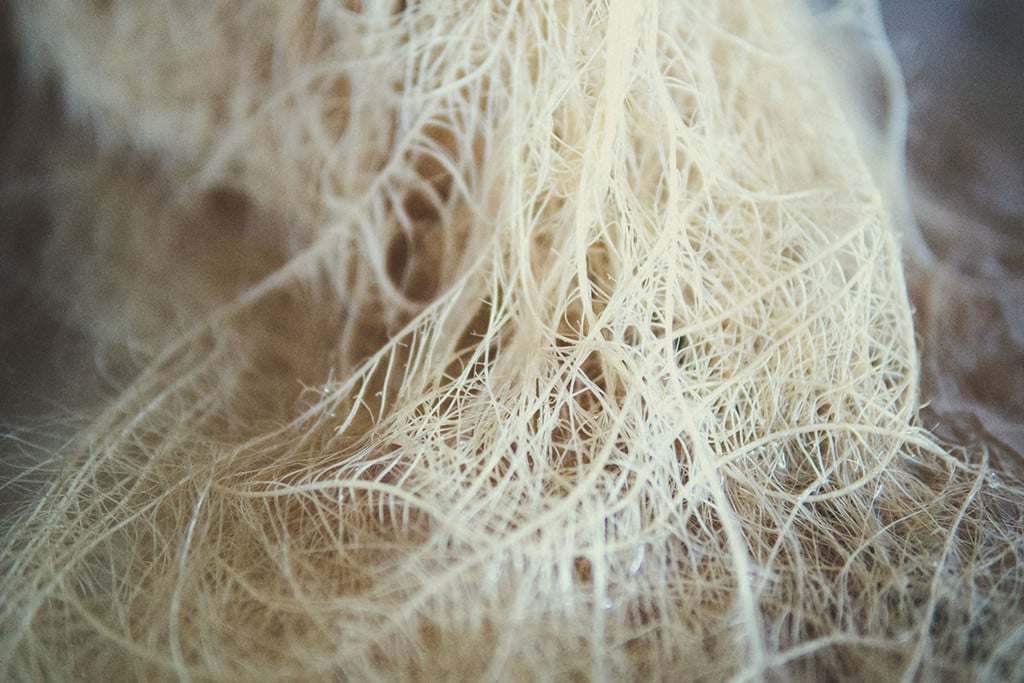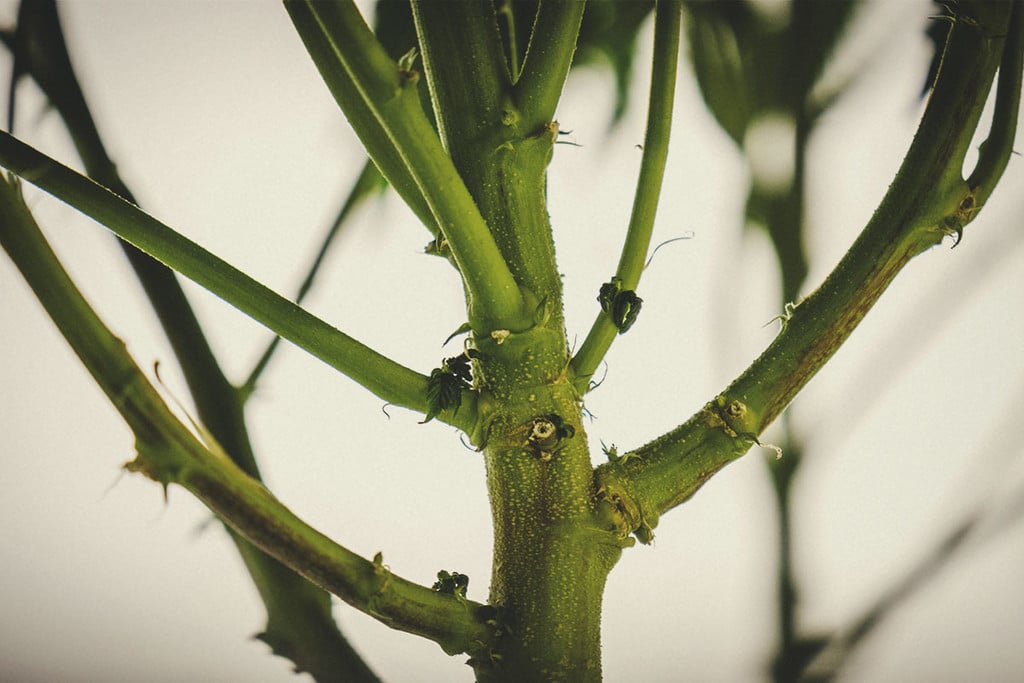.
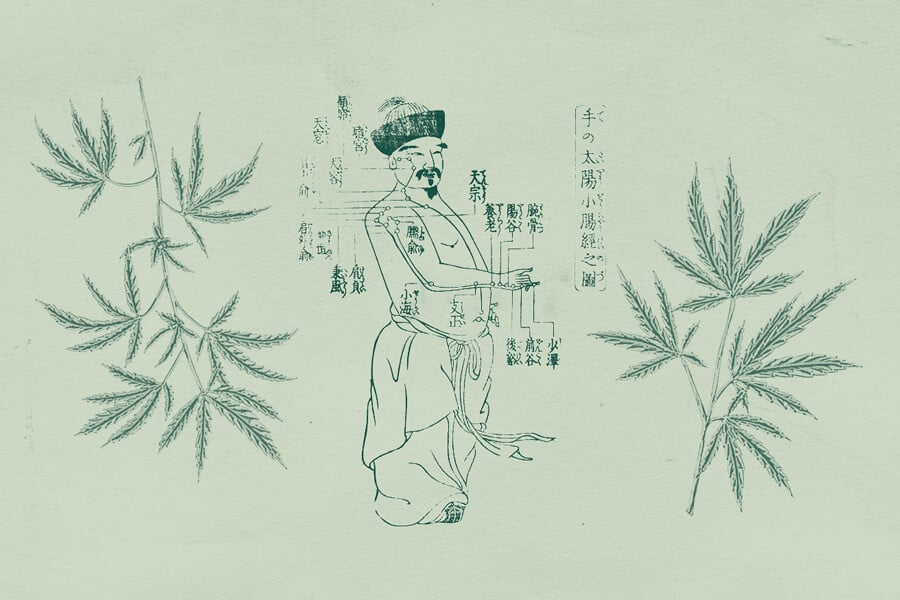
The Use of Cannabis In Traditional Chinese Medicine
Cannabis has long been used in traditional Chinese medicinal practices, but which parts, and to what end?
Ancient China was a highly developed civilisation, with some claiming that it has continued unbroken up to this very day, making it the world’s oldest. Ancient Chinese medicine was also a highly developed practice, with a continual stream of writing and research throughout the last millennia.
Though not the most famous plant or technique used, cannabis is referenced in various texts as a plant that could be utilised to treat a range of conditions. In this article, we look at how it was used, and ponder the question of whether they were able to extract and use the psychoactive cannabinoids that this plant is nowadays revered and feared for.
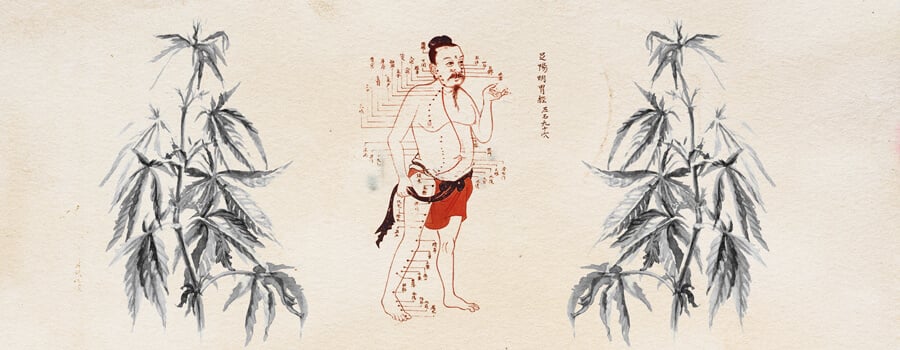
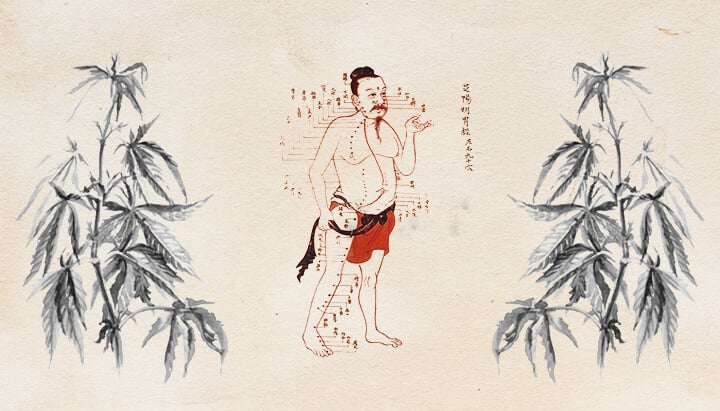
The Ancient Art Of Chinese Medicine
Chinese traditional medicine (CTM) is a much-evolved, yet ancient medicinal practice which dates back at least 5000 years. CTM takes a holistic and philosophical view of health, seeing the body and the universe as one, with treatments following this line of thought.
Some of the more well-known treatments—at least in Europe and the US—are acupuncture, tai chi, dietary therapy, and qigong, all of which seek to create harmony within the body, and between the body and the universe.
An essential concept in CTM is that of Qi (Chi). Qi is a vital energy that flows through channels in the body. When the flow is uninterrupted, a person is healthy, happy and at one with the universe. If the channels become blocked or somehow disrupted, then problems can occur, depending on whether the blockages are.
If you’ve ever wondered how acupuncture works, then Qi is the answer. The needles are placed along the channels through which Qi flows, unblocking them and releasing this vital energy. Tai Chi is a movement-based practice that seeks to unblock and balance Qi through bodily flow.
Qi, the vital force of the universe, exists in all things, including throughout nature, and therefore in plants and foods. So, TCM supposes that if a person consumes appropriately, they can help to maintain harmony with the universe.
Though not always the most well-known facet of TCM, cannabis (or “da ma”) is thought to have beneficial properties.
What Is The Oldest Reference To Marijuana?
Once emperor Sheng Nung (2696–2737 BCE), now deceased, first recorded the use of cannabis in traditional Chinese medicine, around 4800 years ago—so it’s been used for quite some time.
But it wasn’t until around 2000 years ago that cannabis was recorded in The Divine Farmer’s Materia Medica, a sort of medical encyclopedia outlining medicines and medicinal practices, and which is still in use today.
However, the ancients of China, on the whole, weren’t smoking cannabis and rather used the crushed seeds, leaves and inflorescences in conjunction with other foods.
Below, we will outline some of the ways in which cannabis was used in Ancient Chinese medicinal practice.
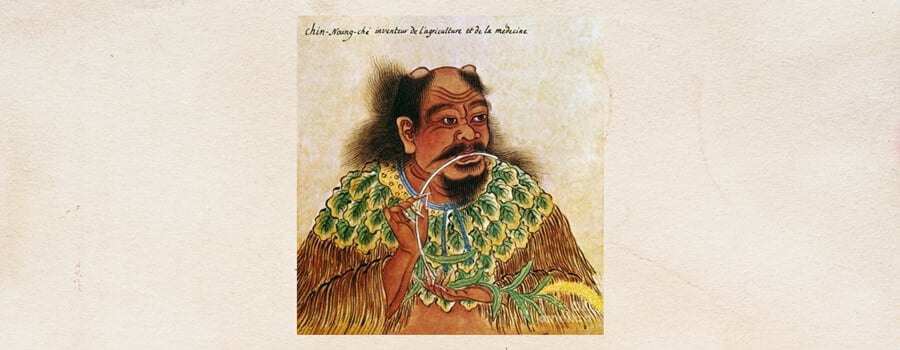
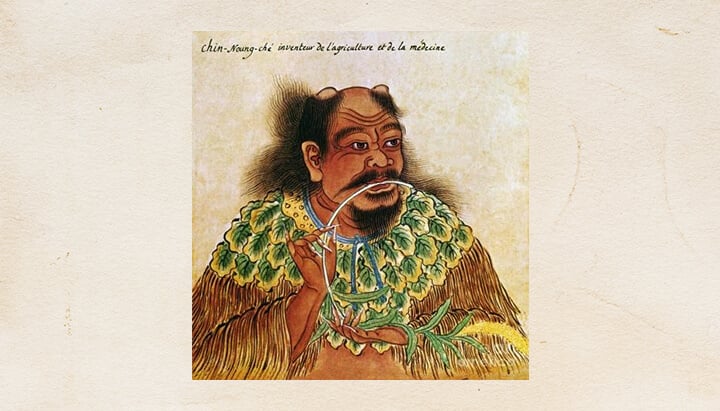
What Was The Use Of Cannabis In Ancient China?
Cannabis was a common crop in ancient China, mostly grown for food and the once-revered fibres produced by the hemp plant, which until very recently were a key material across the world, for thousands of years.
It’s probably fair to say that cannabis was not primarily a medicine, and that its medicinal uses were varied and unclear (more on this below).
Fibre
Primarily, cannabis (or hemp), was cultivated for its fibres. These tough, stringy fibres are an incredibly versatile and strong material that could be put to use making textiles, ropes, sails, paper, fishing nets and more.
The agricultural text Essential Techniques for the Welfare of the People (Qi Min Yao Shu) described techniques for the cultivation of hemp in great detail, even featuring, in its monograph, one of the first textually documented applications of fertiliser. The same text also recognises the dioecious nature of these plants, and explains that the removal of male plants prior to the flowering period will result in female plants not producing seeds. But they did not suggest doing this, indicating that the ancients did not seek to grow seedless female cannabis plants—indicating they were not after cannabinoid-rich flowers.
Food Crop
Cannabis seeds and roots were consumed as foods in ancient China. Although, at this point, it can be hard to draw a clear distinction between food and medicine, many foods were thought to have medicinal, preventative properties, much like in Indian Ayurvedic practice.
Using seeds and roots as food can be seen as a natural progression, given that large quantities of the plant were cultivated for fibre anyway—and it would not have made sense to waste the rest of it.
Whether cannabis-as-food would have existed had it not been grown for its fibres is unclear. But given that wild (or “feral”) cannabis grows quite commonly across China, it is possible that this plant would still have been foraged as a food.
Holistic Therapies
There is dispute and confusion over exactly how cannabis was used in TCM. Today, the only parts of the plants that remain in use are seeds (achenes). But there is evidence which suggests[1] that this was not always the case.
The Chinese Bencao (medical texts) outline the use of cannabis regularly, but diverge in how it should be used, and which parts of the plants should be used. What’s more, it is not entirely clear whether plants would have contained meaningful quantities of cannabinoids, nor whether they would have been processed and consumed in ways that made these bioavailable.
Evidence indicates that, whilst most cannabis grown in ancient China was hemp cultivated for its fibres, the ancients did distinguish between this type of hemp, and that with psychoactive properties. But it seems the use of psychoactive cannabis was intermittent and poorly understood.
For instance, texts vary in how they name different parts of the plant, indicating that practitioners had differing understandings of it, and that, even if some knew how to extract the psychoactive compounds from the plant, that this was not common knowledge.
There is limited reference to plant flowers (where the cannabinoids are contained), and no evidence from texts that these were ever prepared in ways which made the cannabinoids bioavailable. That being said, certain prescribed uses of the plant do indicate that at least some were extracting the psychoactive effects. These uses will be outlined in the following section.
However, for now, it’s important to note that they are all uses we would today recognise as coming from the effects of CBD and THC. But in short, it is unclear exactly how cannabis was used in ancient Chinese medicine. Whilst it seems likely that some were experiencing the drug effects of the plant, it seems likely that this was not commonplace.
Furthermore, reference to the plant flower dwindled over time, until mainly the seeds were referenced in medical texts (which do not contain psychoactive compounds).
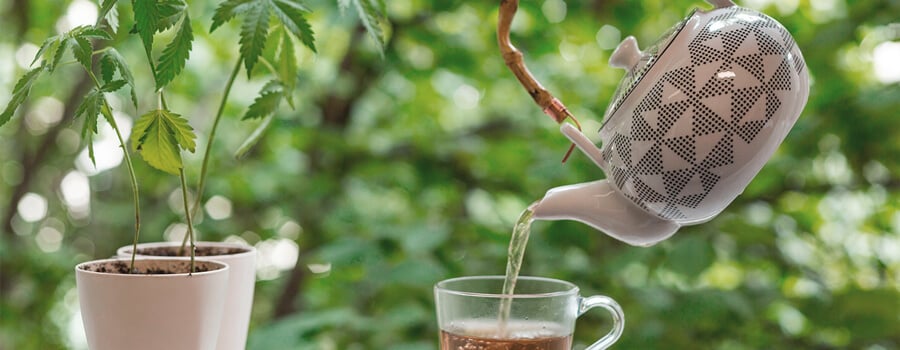
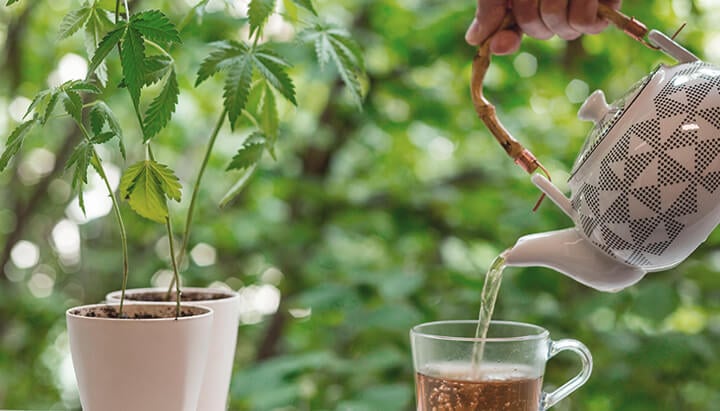
Cannabis In Chinese Medicine
As mentioned, cannabis is referenced in various texts as being a viable treatment for a variety of conditions and disorders that it is today being researched in relation to.
Cannabis And Mood Disorders
In the 7th Century AD, Sun Simiao wrote of how cannabis could be used to treat “wind withdrawal”. Wind withdrawal was characterised by depression and an excessive desire to be alone.
Much later texts, from as recently as the 20th Century suggest a similar use for cannabis, as a potential treatment for agitation, hysteria, and insomnia. These texts include Li Chengh’s Pharmacognosy and Yang Huating’s illustrated Analysis of Medicines.
Cannabis And Physical Discomfort
There are at least three distinct references to using cannabis to treat pain.
One comes from Tao Hongjing, another from Su Song and another from Sun Simiao. Interestingly, these specifically mention taking seeds as pain relief, or in the case of Su Song, taking seeds alongside wine to treat the pain caused by broken bones.
This raises an interesting question: why was cannabis thought to have pain-relieving properties, but the seeds prescribed?
Was it a mere coincidence that parts of the cannabis plant were suggested for these purposes, or were their psychoactive effects known, but not understood fully enough to prescribe the correct parts of the plant?
Cannabis And Anaesthesia
There are some references to using cannabis as an anaesthetic in TCM. The first comes from the 3rd Century AD, courtesy of Hua Tuo. Fascinatingly, he claimed to have created an anaesthetic which was used for surgical procedures, making him well ahead of his time. Unfortunately, the techniques and recipe were lost with his death.
Another author, Bian Que, wrote about how a combination of cannabis and other herbs would bring patients to a tranquil state where they would be numb to pain, allowing surgeons to operate. How effective this was remains a mystery.
Modern Cannabis: Chinese Medicine Vs Western Medicine
The use of cannabis as a medicine has, as you can see, a very long history in ancient Chinese medicine. The same cannot be said for modern medicinal practice, where cannabis has only seriously entered the scene in the last few decades, just several millennia behind the curve!
For now, it remains unclear exactly how cannabis was used in TCM, with modern interpretations using only seeds. Were the ancients onto something, utilising the effects of THC and CBD, or did they accidentally just use the wrong parts of the right plant?



























